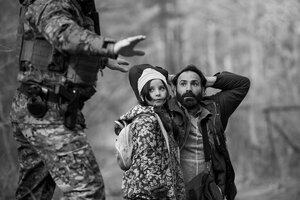With powerful ‘Green Border,’ a filmmaker searches for humanity in immigration stories

Syrian father Bashir (Jalal Altawil) and his daughter Ghalia (Talia Ajjan) are confronted by border guards in Europe in “Green Border” from director Agnieszka Holland.
Agata Kubis
The border in Agnieszka Holland’s powerful “Green Border” is a swampy, forested exclusion zone between Belarus and Poland.
Beginning in 2021, when the film takes place, refugees from the Middle East and Africa attempting to seek asylum in the European Union were mercilessly used as pawns in a cynical ongoing geopolitical game. Promised safe passage by Belarusian dictator Alexander Lukashenko, whose true intention was to fan anti-immigrant ire, they found themselves trapped inside a 2-mile-wide no-man’s-land and brutalized by both sides.
Holland, who co-wrote the film with Maciej Pisuk and Gabriela Łazarkiewicz, divides the narrative into four chapters, whose stories overlap. In the first, “The Family,” we follow a Syrian family – Bashir (Jalal Altawil); his devoutly religious father (Mohamad Al Rashi); his wife, Amina (Dalia Naous); and their young children, including the mischievous, scampering Nur (Taim Ajjan) – as the group flies into Belarus’ Minsk airport from Turkey. They are elated by the hope of the better life they believe will be theirs when they reach their final prearranged destination with a relative in Sweden. Joining them is Leïla (Behi Djanati Atai), an Afghan woman who, alone among them, speaks English and carries cash. She has a special fondness for Nur.
Why We Wrote This
“Green Border” is one filmmaker’s response to the treatment of immigrants in Eastern Europe. It is ultimately about moral choices, says the Monitor’s critic. And the film itself is a moral act.
Shot in stark black and white, the film plunges us almost immediately into the harrowing reality of the immigrants’ plight. Wandering to Poland in the dark forest, they are rounded up and literally tossed back and forth between the borders. Desperately trying to sustain their collective humanity, they do what they can to survive, even if it means squeezing damp plants for water.
Subsequent chapters pull us deep inside the workings of both xenophobic Polish border guards and Polish pro-immigrant activists. Singled out particularly are Jan (Tomasz Włosok), a guard who is torn apart by the cruelty he is ordered to perpetrate, and Julia (Maja Ostaszewska), a psychologist who offers up her home and car to the immigration lawyers and rescue workers, and risks her life on missions into the forest.
Although we are watching actors, Holland’s in-your-face documentary-style realism gives the action an immediacy that transcends its scripted origins. Occasionally the film lapses into melodramatic excess. But given its subject, it’s difficult to see how it could have been done otherwise. What grounds the overflow of incident are the many human touches that personalize both the anguish and the stray glimpses of freedom.
In one scene, a Polish doctor administers a portable prenatal scan to a pregnant Somali woman on the forest floor. In another, Julia seeks out Nur, who has wandered away from his family, in an attempt to save him. Suspected of being a refugee herself by the border guards, she proves her nationality by reciting, angrily, in Polish, the Lord’s Prayer.
Near the end, Jan, alone in his truck, cries out in rage at what he has witnessed. In perhaps the film’s most quietly compelling scene, he inspects a van crossing into the border and, opening its back door, sees two eyes peering back at him in the darkness. He pauses for a moment and then steps away and allows the van to pass. In that moment, he has found his humanity.
Upon its release, “Green Border” was castigated in Poland by its then-justice minister, Zbigniew Ziobro, for being “Nazi propaganda.” Holland had family members killed in the Holocaust. A native-born Pole, she currently is residing in France with many celebrated achievements to her credit, ranging from “Europa Europa” to HBO’s “The Wire,” for which she directed several episodes. She has said that she made this immigrant saga because she could “no longer stand the feeling of hopelessness.”
What she offers up, in the face of so much suffering, is a higher aspiration. A brief epilogue depicts Polish guards, including Jan, rescuing Ukrainian immigrants, albeit racial kindred, fleeing the war. Just before this we are shown a group of African boys who have been given shelter in the home of a middle-class Polish family with two teenagers of their own. Up until this point, Holland’s vision has been so unrelenting that, when we watch these teens rapping together, the hard-won moment radiates sheer joy. “Green Border” is ultimately about moral choices. The film itself is a moral act.
Peter Rainer is the Monitor’s film critic. “Green Border” is unrated. It is in Polish, Arabic, English, and French with English subtitles.
